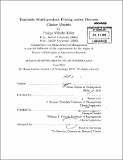Tractable multi-product pricing under discrete choice models
Author(s)
Keller, Philipp W. (Philipp Wilhelm), 1982-
DownloadFull printable version (8.405Mb)
Other Contributors
Massachusetts Institute of Technology. Operations Research Center.
Advisor
Retsef Levi and Georgia Perakis.
Terms of use
Metadata
Show full item recordAbstract
We consider a retailer offering an assortment of differentiated substitutable products to price-sensitive customers. Prices are chosen to maximize profit, subject to inventory/ capacity constraints, as well as more general constraints. The profit is not even a quasi-concave function of the prices under the basic multinomial logit (MNL) demand model. Linear constraints can induce a non-convex feasible region. Nevertheless, we show how to efficiently solve the pricing problem under three important, more general families of demand models. Generalized attraction (GA) models broaden the range of nonlinear responses to changes in price. We propose a reformulation of the pricing problem over demands (instead of prices) which is convex. We show that the constrained problem under MNL models can be solved in a polynomial number of Newton iterations. In experiments, our reformulation is solved in seconds rather than days by commercial software. For nested-logit (NL) demand models, we show that the profit is concave in the demands (market shares) when all the price-sensitivity parameters are sufficiently close. The closed-form expressions for the Hessian of the profit that we derive can be used with general-purpose nonlinear solvers. For the special (unconstrained) case already considered in the literature, we devise an algorithm that requires no assumptions on the problem parameters. The class of generalized extreme value (GEV) models includes the NL as well as the cross-nested logit (CNL) model. There is generally no closed form expression for the profit in terms of the demands. We nevertheless how the gradient and Hessian can be computed for use with general-purpose solvers. We show that the objective of a transformed problem is nearly concave when all the price sensitivities are close. For the unconstrained case, we develop a simple and surprisingly efficient first-order method. Our experiments suggest that it always finds a global optimum, for any model parameters. We apply the method to mixed logit (MMNL) models, by showing that they can be approximated with CNL models. With an appropriate sequence of parameter scalings, we conjecture that the solution found is also globally optimal.
Description
Thesis (Ph. D.)--Massachusetts Institute of Technology, Sloan School of Management, Operations Research Center, 2013. Cataloged from PDF version of thesis. Includes bibliographical references (pages 199-204).
Date issued
2013Department
Massachusetts Institute of Technology. Operations Research Center; Sloan School of ManagementPublisher
Massachusetts Institute of Technology
Keywords
Operations Research Center.